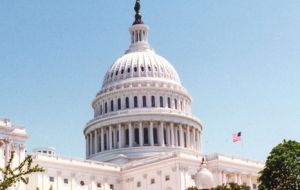MercoPress. South Atlantic News Agency
Obama attacks critics of banking reforms to end “reckless practices”
 President Obama is one vote short in Senate for approval of the bill
President Obama is one vote short in Senate for approval of the bill US President Barack Obama has attacked critics of his banking reforms in a speech which warned that without change the financial crisis will be repeated. Reckless practices and financial firms that acted like “bandits” should never be allowed to operate again, he said.
Regulatory reform was in the financial sector's interests, and bankers and lobbyists should not fight against it. President Barak Obama was speaking Thursday to an audience of bankers and financial experts at the Cooper Union College in New York.
A bill proposing tighter financial regulation is due to be debated in the US Senate next week. It was approved by the House of Representatives in December.
The proposed rules would include a new body to safeguard consumers' rights—a consumer protection agency at the US Central Bank, the Federal Reserve—which would have powers to regulate all lending. But many people in the financial sector are aghast at the proposed changes.
Mr Obama said that he was not, as some have argued, against the power of the free market.
“But a free market was never meant to be a free licence to take whatever you can get, however you can get it. That is what happened too often in the years leading up to the crisis,” he told the New York audience.
“Some on Wall Street forgot that behind every dollar traded or leveraged, there is a family looking to buy a house, pay for an education, open a business, or save for retirement.” What happens here has real consequences across our country,“ he said.
”It is essential that we learn the lessons of the crisis, so we don't doom ourselves to repeat it.“
Financial reforms would ensure that the markets no longer ”operated in the shadows of our economy, invisible to regulators and to the public“.
Abuses and excesses were rampant, the President said. But it was now essential that regulators had the power to ”shut these firms down with the least amount of collateral damage to innocent people and businesses“.
The reform proposals include setting up a 50 billion fund to assist with orderly liquidation of banks. But Republicans see this as still allowing taxpayer bailouts, arguing that any fund could borrow from the Treasury.
The bill also suggests limiting banks' involvement in proprietary trading—where they trade their own money rather than that of investors—the so-called Volcker Rule, after the former head of the Federal Reserve who is now an adviser to President Obama.
And it proposes limiting banks' investments in hedge funds and private equity funds, and more say for investors on executive pay.
Mr Obama made special mention of the ”battalions of financial industry lobbyists descending on Capitol Hill, as firms spend millions“ to try to block his reforms. President Obama has a 59-41 Democrat majority over Republicans in the Senate, but that is one vote short of the number needed.
Republicans largely view the bill as just more government bureaucracy, and they are pushing for parts of it to be changed.
But the US Treasury Secretary, Timothy Geithner, said he was confident that financial reform legislation will pass. He says Republican opposition appears to have softened. He told CBS Television earlier: ”If you just listen to the tone of the last couple of days, it's changed.“
”I spent a huge amount of time with Republicans over the last few weeks ... and I think they really want to be for this.“
Opposition to the bill in any case puts Republicans in an awkward spot, says BBC North America editor Mark Mardell.
”If they vote against it they will be painted as the party that backed their wealthy friends on Wall Street, and put at risk the people on Main Street.”
If he does succeed in attracting at least the one Republican vote and gets it through the Senate, it will still have to be reconciled in a joint committee with the House, before it goes to the president for his signature and becomes law.




Top Comments
Disclaimer & comment rulesCommenting for this story is now closed.
If you have a Facebook account, become a fan and comment on our Facebook Page!